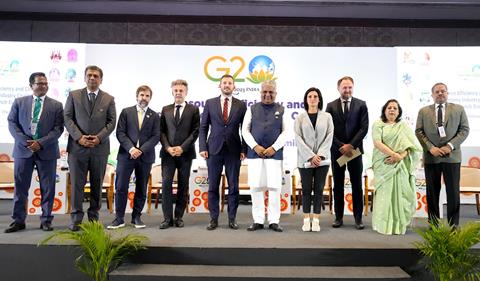Launch of RECEIC: A Leap Towards Circular Economy and Sustainable Growth in India
Union Minister Bhupender Yadav launches the Resource Efficiency Circular Economy Industry Coalition, promoting sustainable economic growth and a circular economy through industry-led strategies.
In a watershed moment for the Indian environment and climate movement, Union Minister Bhupender Yadav officially launched the Resource Efficiency Circular Economy Industry Coalition (RECEIC) in Chennai. This industry-led coalition envisioned to transform ambitions into real-world strategies, marks a significant shift towards sustainable economic growth by advocating for resource efficiency and a circular economy.
Bhupender Yadav officially launched the Resource Efficiency Circular Economy Industry Coalition (RECEIC) in Chennai. This industry-led coalition envisioned to transform ambitions into real-world strategies, marks a significant shift towards sustainable economic growth by advocating for resource efficiency and a circular economy.
RECEIC was announced at the 4th G20 Environment and Climate Sustainability Working Group (ECSWG) and Environment and Climate Ministers meeting, a high-profile event that witnesses intense discussions on pressing environmental issues. By establishing RECEIC, the Indian government aims to facilitate strategic alliances, encourage technological collaboration, and stimulate knowledge transfer within the industry. These steps are considered crucial to fostering innovation and expanding access to finance.
With the founding charter’s signing and the logo’s unveiling, Minister Yadav expressed faith in RECEIC to serve as a crucial tool in facilitating sustainable growth. The industry-led coalition, comprised of 39 founding members, promises a symbiotic relationship where the environment and industry can thrive.
Devised by the Indian G20 Presidency, the RECEIC operates beyond a singular event or a restricted timeline. Instead, it positions itself as a long-term, self-sustaining entity that continues to function regardless of changes in political leadership. The coalition’s mission is ambitious but achievable: to bolster company-to-company collaboration, advance capabilities across different sectors, learn from the diverse experiences of its members, and kickstart on-the-ground private sector action to increase resource efficiency and expedite the transition to a circular economy.
This move is far from symbolic; it seeks to catalyze real change. The RECEIC framework is organized around three main pillars: partnerships for impact, technology cooperation, and finance for scale. This dynamic structure enables the coalition to remain responsive to evolving needs and trends while working towards a sustainable and resilient future.
Furthermore, the coalition aligns with the broader international commitments the G20 and other global platforms set. It aims to contribute to global goals and, over time, may be invited to participate in the G20 Resource Efficiency Dialogue. This participation would allow RECEIC to share its experiences and success factors on a global stage, influencing international policy-making towards resource efficiency and circular economy.
At the same time, RECEIC is a comprehensive platform for industries to address their information gaps and coordination challenges, which are crucial factors that often obstruct effective cross-border collaborations.
The Chennai ECSWG meeting allowed wide-ranging discussions on water resource management, climate change, and the blue economy, culminating in compelling exchanges on the draft Communique. The launch of RECEIC at this high-profile event only underscores its anticipated significance.
This Indian initiative is expected to become a standard-bearer for other nations, particularly those grappling with the dual challenge of economic growth and environmental sustainability. As we move forward, the RECEIC’s success will be measured by its ability to drive change within India’s borders and its potential to inspire similar initiatives globally.
The launch of RECEIC is more than a mere institutional setup; it’s a firm commitment towards a circular economy and sustainable growth, a step towards a better future for all.
